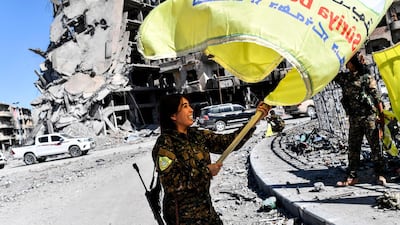The main Syrian Kurdish force fighting ISIL declared on Sunday that it had successfully cleared areas east of the Euphrates river of the militants, with help from the US-led coalition and Russian forces.
The announcement came after US defence secretary James Mattis said Washington would stop arming the People's Defence Units (YPG) as offensive operations against ISIL come to an end.
YPG spokesman Noureddine Mahmoud praised US and Russian air and logistical support as well as ground operations co-ordination. He said the YPG — which forms the backbone of the US-backed Syrian Democratic Forces, an alliance of Kurdish and Arab fighters — was ready to form joint operation rooms with the different partners to complete the fight against ISIL.
"We hope for an increase of the support and ensuring air protection and necessary cover," Mr Mahmoud said at a press conference in Al Salihiya, a town in Deir Ezzour province on Sunday.
The press conference was attended by a Russian general from the Russian base in Hmeimim, in western Syria.
The SDF has been battling ISIL fighters east of the Euphrates river in Deir Ezzour province since September. In a separate campaign, Syrian government forces, backed by Russia and allied Iranian-backed militia, have been chasing the extremists on the other side of the river.
_______________
Read more:
Syria peace talks will continue until December 15, UN envoy says
Opinion: Russia is in Syria for the long term
_______________
Russia and the United States kept in contact, in so-called "de-confliction" talks, to prevent clashes between the two forces. US officials said communication was also maintained on the ground, including in meetings between SDF commanders and their counterparts on the government side.
Mr Mahmoud also praised the role tribal leaders played in the fight against ISIL in oil-rich Deir Ezzour province, where tribesmen play an integral role in consolidating power there.
The extent of SDF co-operation with Russian forces and their Syrian allies is not clear, however. The Kurdish-led forces now control nearly 25 per cent of Syrian territories and important oil resources after their battlefield successes in northern and eastern Syria. But they are landlocked and economically dependent on areas controlled by the Syrian government, as well as on borders controlled either by Iraqi forces or Damascus.
Meanwhile, building relationships with the tribal leaders in Deir Ezzour is an essential part of any effort to continue to hold ground. Arab tribes are sceptical of the Kurdish-led forces, although they have previously worked together, with US support.
But Washington's support for the SDF has come into question after the fall of Raqqa, ISIL's former Syrian stronghold, and the near collapse of the militants' hold on territory in Syria. Turkey, which considers the YPG an extension of its Kurdish militant group, the Kurdistan Workers' Party (PKK), has protested Washington's reliance on the SDF, as well as the provision of heavy weaponry to its fighters in the battle against ISIL.
On his way to Cairo on Friday to meet with Egyptian officials, Mr Mattis told reporters that the US will stop arming the Kurdish forces, instead turning to stabilisation efforts and supporting the diplomatic process in Syria.
"As the coalition stops offensive operations, then, obviously, you don't need that, you need security … you need police forces. That's local forces. That's people who make certain that [ISIL] doesn't come back," he said.
Mr Mattis added that the SDF "are changing their stance as they come to the limits of where they are going".
Also on Sunday, the Russian defence ministry said six of its long-range Tu-22 bombers had carried out raids against ISIL targets in Deir Ezzour province.
It said the bombers took off from Russia and were accompanied by fighter jets from Hmeimim.
The targets included ammunition warehouses and equipment clusters, the ministry added.
Separately, Syrian activists and a war monitor said air strikes in the rebel-held Damascus suburb of Eastern Ghouta killed at least 18 people, including at least five children. The activist Ghouta Media Centre and the Syrian Observatory for Human Rights monitoring group said the air strikes hit at least four neighbourhoods in the suburb, leaving scores injured.
Eastern Ghouta has been under a tightening siege since 2013 and is already facing a humanitarian crisis, including the highest recorded malnutrition rate since the conflict began in 2011. Some 400,000 civilians, half of them children, are believed trapped there.

